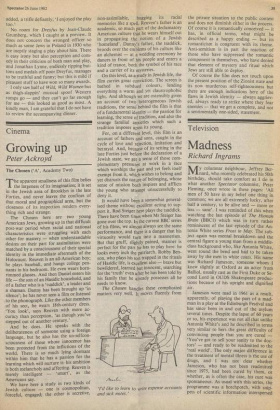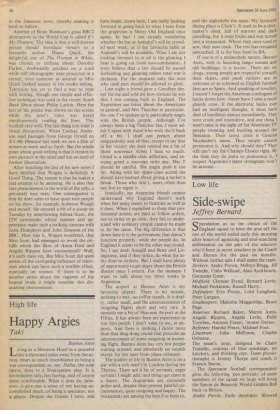Television
Madness
Richard In grams
My columnar neighbour, Jeffrey Ber- nard, who recently celebrated his 50th birthday, should take comfort as 1 do in what another Spectator columnist, Peter Fleming, once wrote in these pages: 'All men of 50 have in my belief one thing in common; we are all extremely lucky, after half a century, to be alive and — more or less — sane'. I was reminded of this when watching the last episode of The Human Brain (BBC') which was in turn rather reminiscent of the last episdcle of the An- tonia White series Frost in May. The sub- ject again was mental breakdown and the central figure a young man from a middle- class background who, like Antonia White, went round the bend and had to be taken away by the men in white coats. His name was Richard Jameson, someone whom I knew slightly at Oxford as an actor from Balliol, usually cast as the First Duke or Se- cond Lord in OUDS Shakespeare produc- tions because of his upright and dignified air.
Jameson went mad in 1961 as a result, apparently, of playing the part of a mad- man in a play at the Edinburgh Festival and has since been in and out of the asylum several times. Despite the lapse of 60 years or so, his experience was not all that unlike Antonia White's and he described in terms very similar to hers the great difficulty of convincing people that you are cured — 'You've got to sell your sanity to the doc- tors' — and ready to be readmitted to the 'real world'. The only major difference in the treatment of mental illness is the use of drugs, and I was not clear whether Jameson, who has not been readmitted since 1975, had been cured by them, or whether, as is often the case, his cure was spontaneous. As usual with this series, the programme was a hotchpotch, with snip- pets of scientific information interspersed in the Jameson story, thereby making it hard to follow.
Another of Brian Wenham's great BBC2 alternatives to the World Cup is called It's My Pleasure. The idea is that a well-known person should introduce viewers to a favourite author. Diana Quick, the delightful star of The Woman in White, was chosen to enthuse about Dorothy Parker. Awkwardly perched on a stool while still photographs were projected in a corner, even someone as assured as Miss Quick looked uneasy in the studio setting. Television has yet to find a way to cope with writing, though one simple and effec- tive technique was used in the recent South Bank Show about Philip Larkin. Here the text of his poems was shown on the screen while the poet's voice was heard simultaneously reading the lines. This worked very well. The last thing you want is visual distractions. When Lindsay Ander- son read passages from George Orwell on It's My Pleasure last week we saw a film of miners at work and so forth. But the whole point about good writing is that it creates its own pictures in the mind and has no need of further illustration.
After watching the last of his new series I have decided that Wogan is definitely A Good Thing. The reason is that he makes a real attempt to be amusing. He is also that rare phenomenon in the world of the telly, a genuinely nice man. One consequence is that he does seem to have quite nice people on his show, for example Auberon Waugh and myself. He secured a bit of a scoop on Tuesday by interviewing Selena Scott, the ITN newsreader whose manner and ap- pearance make such a striking contrast with John Humphrys and John Simpson of the BBC. How was it, Wogan wondered, that Miss Scott had managed to avoid the pit- falls which the likes of Anna Ford and Angela Rippon have encountered? Well, it's early days yet, But Miss Scott did seem aware of the corrupting influence of televi- sion which can have such a terrible effect, especially on women. If there is to be another series about the vagaries of the human brain it might examine this dis- quieting phenomenon.























































 Previous page
Previous page